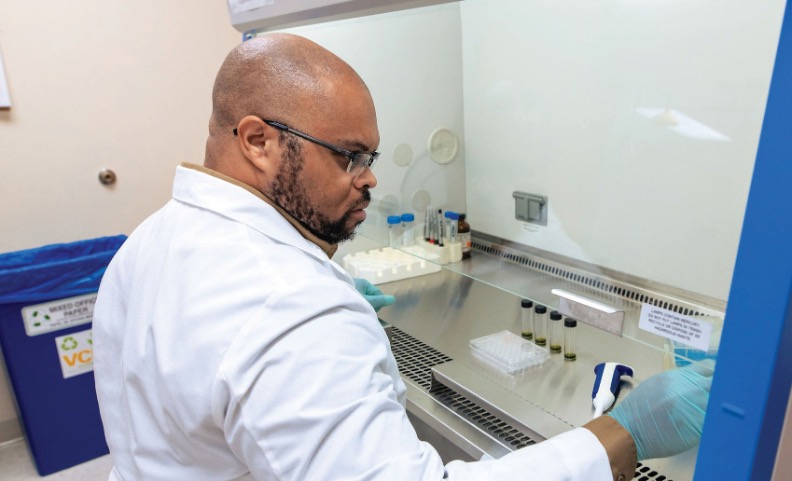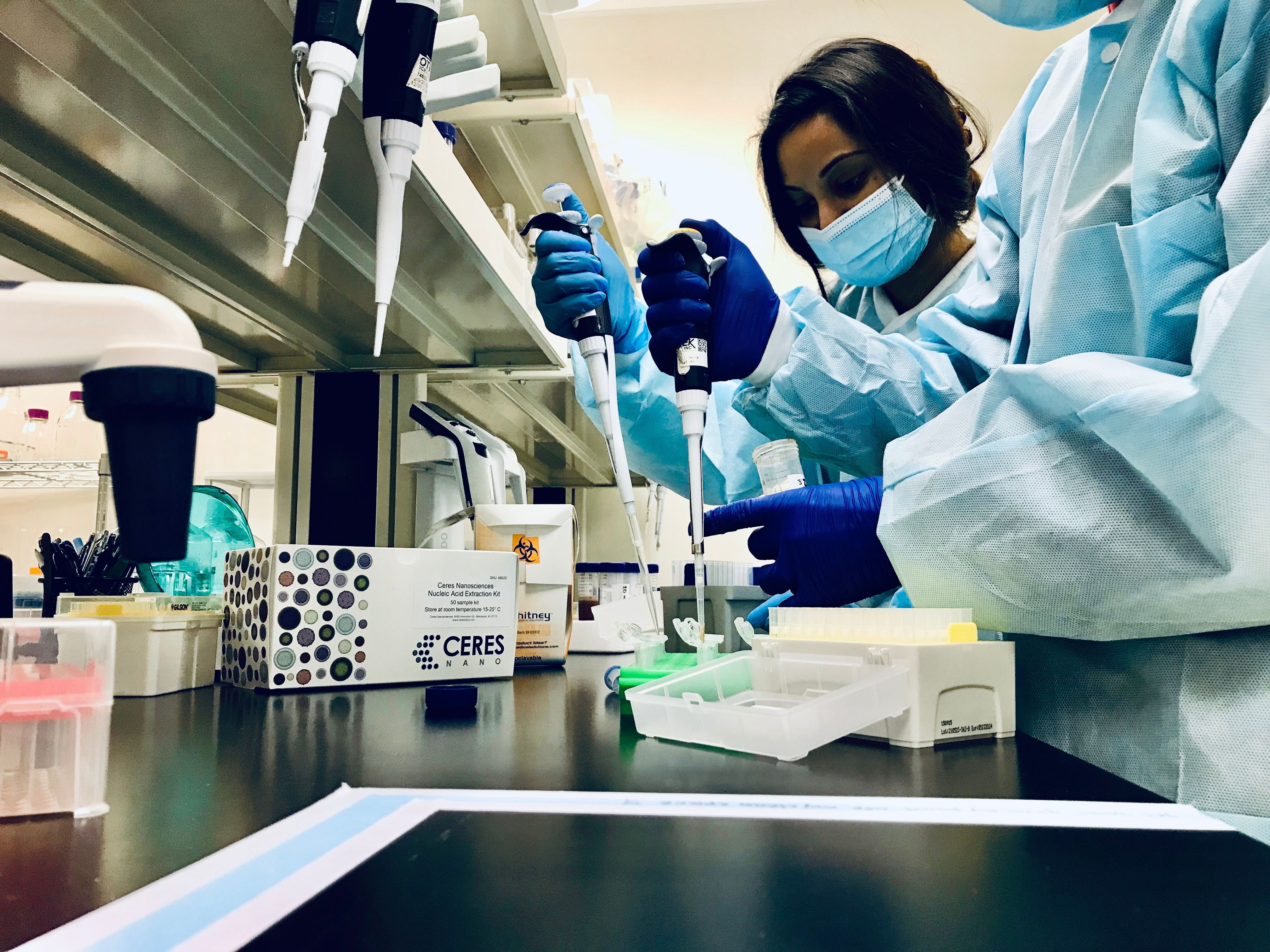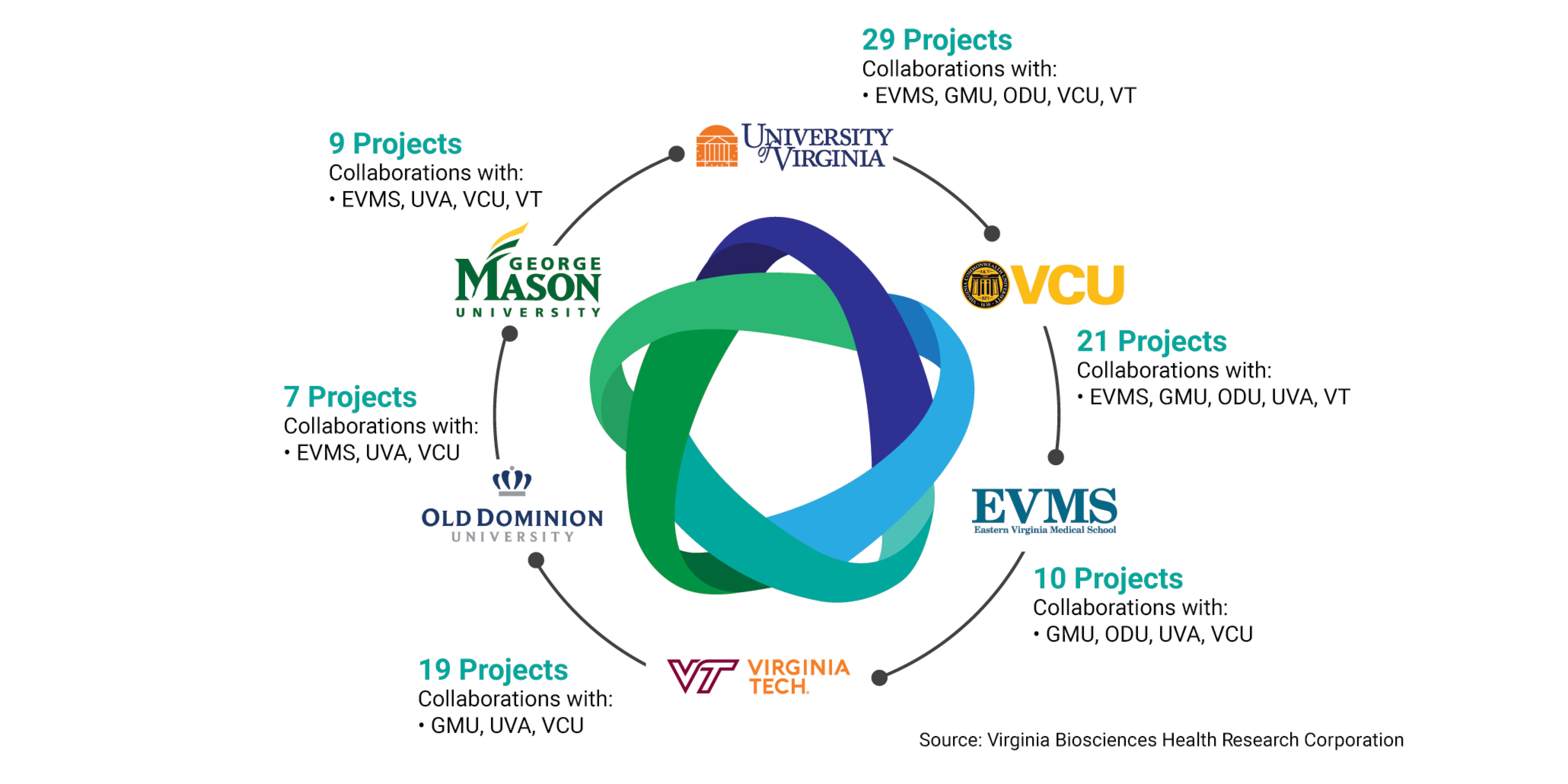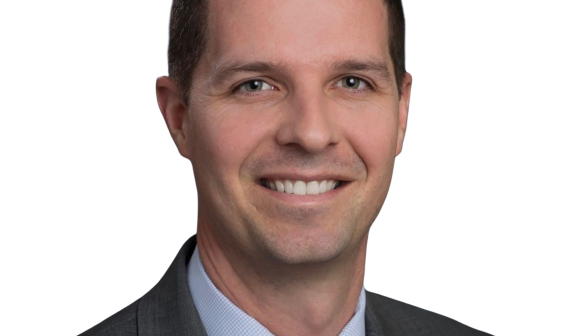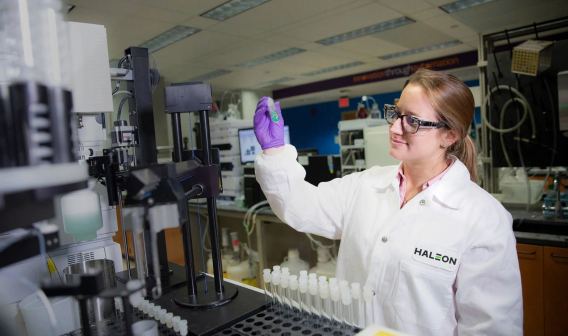Virginia Life Sciences Ecosystem Helps Make Research Breakthroughs Reality
Like many medical device startups, Luminoah began with a bright idea brought about by a personal need. In 2019, founder Neal Piper’s young son, Noah, had a medical issue that necessitated the use of a feeding tube. The tube required Noah to stay still for up to six hours a day — a near-impossible task for a toddler — and it would often leak or become dislodged, resulting in an emergency trip to the doctor.
Feeding tube problems can lead to serious, potentially fatal side effects, on top of the discomfort of the tube itself. In 2020, Piper founded Luminoah, a company whose nutritional delivery system — a wearable medical device with integrated software for monitoring and operation — he hopes will “revolutionize” care for the nearly 500,000 people who use feeding tubes in the United States each year. He says the system “will completely eliminate the need for patients having an IV pull.”
Also like most medical device startups, Luminoah’s “Eureka!” moment was quickly followed by financing questions. Researchers like Piper’s team must demonstrate both the need for their product and the efficacy of that product before beginning the regulatory approval process, itself a mandatory step that must be completed before a company can begin to make money from the product. Combine those factors with the capital-intensive nature of medical research, and the need for a robust support system for startups becomes apparent.
Without CvilleBioHub, we wouldn't have been able to source the talent that we have.
Resources for life sciences startups can include accelerators that offer low-cost lab space, organizations to connect like-minded researchers, and funding sources to help defray operating costs as companies work toward scientific and operational milestones. Those funding sources can be state-operated, like the Virginia Catalyst and Virginia Venture Partners Funds (VVP Funds) in the Commonwealth, or made up of individual investors looking to back promising ideas.
Luminoah has received nearly $1 million in seed funding from Virginia-based investors, and Piper also attributes the company’s growth to CvilleBioHub, an industry-led nonprofit that provides mentorship, facilitates connections, and generally supports Virginia-based startups in the life sciences sphere with “whatever they need help with,” according to Nikki Hastings, the organization’s entrepreneur in residence.
In addition to connecting with other founders at a high level, CvilleBioHub hosts an internship program that pulls from the many institutes of higher learning in the area, including the University of Virginia’s (UVA) biomedical engineering master’s program. Needing to staff up quickly, the company benefited from the ability to draw talent from the internship program.
“One of those engineers is now working with us full-time and has been a key member of the team helping lead development of our R&D process,” Piper said. “Without CvilleBioHub, we wouldn’t have been able to source the talent that we have.”
Getting Fledgling Companies off the Ground
CvilleBioHub is one of several programs scattered across the state that provide resources, investment, and expertise to help life sciences companies grow. According to Virginia Bio, a trade association that serves and promotes the life sciences industry in the Commonwealth, the industry contributes $8 billion to the Commonwealth’s economy annually, with nearly 1,500 companies employing more than 75,000 Virginians, and the share is growing. “Our goal is to double the size of the industry by 2030,” said CvilleBioHub Executive Director Steph Oettinger, whose organization is the model for similar hubs being launched in Northern Virginia, Richmond, Roanoke/Blacksburg, and the Hampton Roads region. Those groups will be funded in part by a 2020 GO Virginia grant, which will also support a new statewide life sciences hub, Virginia Bio-Connect.
The Prince William Science Accelerator, anchored by George Mason University’s (GMU) Science and Technology campus, was launched in 2014 to provide space and resources to young entrepreneurs and biosciences graduates. Now, many of those companies are outgrowing the accelerator. Four of the companies based in the accelerator plan to move into the recently launched Northern Virginia Bioscience Center. ISOThrive, a gut health company, was the first accelerator tenant and will move to a much larger lab at the new facility.
In Richmond, the VA Bio+Tech Park benefits from its proximity to Virginia Commonwealth University (VCU). More than 150 companies have started in the VA Bio+Tech Center, the park’s life sciences incubator, with approximately a quarter of those beginning with ideas developed at VCU. Currently, 48 companies operate out of the VA Bio+Tech Center.
The city of Virginia Beach opened its own dedicated accelerator space in 2021. The new home of the VABeachBio Accelerator — initially launched in 2015 in partnership with Tidewater Community College — will be ready for startups this year, according to Facility Logix, a consulting firm hired by the city to manage the accelerator. The city is looking to lease the space to small companies and winners of the VABeachBio Innovation Challenge, an open competition focused on developing solutions to health problems that affect veterans.
State Funds, Partnerships Support Innovation
Accelerator facilities can solve many problems for startups, including seed funding in some cases. But research-intensive life sciences startups require significant capital to reach key milestones, necessitating other sources of funding — and Virginia is continuing to develop resources to supplement and incentivize private investment.
A lot of these projects haven't achieved enough to really attract sophisticated venture capital. They need to get their intellectual property in, create a prototype, create a proof of concept. Our funding helps them do that, allowing them to go out and raise capital.
The Virginia Catalyst fund from the Virginia Biosciences Health Research Corporation, a partnership between state government and six Virginia public research universities — GMU, UVA, VCU, Old Dominion University, Virginia Tech, and Eastern Virginia Medical School — issues grants that support collaborative partnerships between industry partners, health systems, and two or more Virginia universities. The fund has awarded more than $21 million in grants since 2013, supporting 46 collaborative projects with 35 industry partners, and President and CEO Mike Grisham says the grants have led to $245 million in follow-on funding from venture capitalists and other sources.
“A lot of these projects haven’t achieved enough to really attract sophisticated venture capital,” Grisham said. “They need to get their intellectual property in, create a prototype, create a proof of concept. Our funding helps them do that, allowing them to go out and raise capital from angel investors, venture capitalists, and Fortune 500 corporations that want to invest in and commercialize the innovations we’re creating here in Virginia.”
The Virginia Innovation Partnership Corporation, formerly the Center for Innovative Technology, runs VVP Funds, a family of investment funds formerly known as CIT GAP Funds, which supports life sciences, technology, and cleantech companies. VVP Funds has invested more than $32 million across its target industries since its launch in 2005 while helping connect companies with accelerators, seed funds, and angel investors. While public investment dollars are available, Virginia also has an active private investment ecosystem, ranking 13th in the United States in venture capital deals in 2020, according to the PricewaterhouseCoopers MoneyTree report.
Virginia Catalyst Fund Encourages Collaboration
The Virginia Catalyst fund has backed 46 projects involving 35 industry partners in collaboration with Virginia universities.
A Sweet Success Story in Albemarle County
Other companies are developing partnerships with industry leaders to further their research, development, and production. Bonumose, Inc., a CvilleBioHub member based in Albemarle County, announced an expansion last year, along with a partnership with candy giant The Hershey Company that will enable the company to expand its research into new sugars and develop reduced-sugar confections. Along with Hershey, Bonumose’s backers include sweetener company American Sugar Refining, Inc., the world’s largest cane sugar refiner and marketer.
Bonumose CEO Ed Rogers and Chief Scientific Officer Dan Wichelecki connected at Blacksburg startup Cell-Free Bioinnovations, formed by Virginia Tech researchers, and the company was founded in 2016 with support from a Charlottesville-area angel investor. Last year, the FDA and Health Canada approved Bonumose’s manufacturing method for tagatose, a rare sugar that has minimal effects on blood glucose and insulin levels, using byproducts left over from food production. Now the company is looking to scale up its research and production of tagatose and other rare sugars, backed by some of the food and beverage industry’s biggest names.
“By bringing together the necessary expertise, capabilities, and resources all under one roof, scaling transformative uses of rare sugar alternatives will become a reality,” Hershey Chief Development Officer Kris Meulen said.
Bonumose’s story is an example of the various aspects of the Virginia life sciences ecosystem supporting groundbreaking research — a company based on ideas developed at a Virginia university-affiliated research park, supported by local investors and resources from another Virginia university, which found willing partners in the business community. Now, as the company prepares to apply its research to creating healthier snacks, researchers across the Commonwealth are working to develop the next big life sciences idea, enabled by Virginia accelerators and investors.
